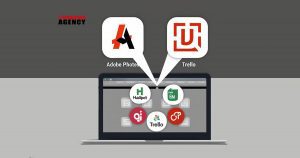As a client, the flair to get through to the best eCommerce platform in the Toronto area lies in a robust online identity. For that to come true, your business or company needs to partner up with some of the country’s best and most cost-effective software and app developers.
Let this precise guide aid your business with the best choice of eCommerce outlet.
Why Use eCommerce Platforms?
eCommerce websites has become one of the fastest revenue-generating industries in the last two years. During COVID-19, almost 20 to 30% of businesses in the USA and Canada started operating online to keep their ventures active during desperate times. As per estimation, the eCommerce industry is rapidly growing, with a 23% rise yearly. 22% of businesses will completely go online by 2025.
With the whopping rise in eCommerce development in Canada, the industry should touch $79.80 billion by the end of 2022 (a 10.4% rise compared to last year), as per the source.
The industry’s fast growth in Canada has caused the emergence of various eCommerce platforms. Finding the best eCommerce platforms in Canada is getting harder for potential entrepreneurs, especially when every other blog is about the shopify vs amazon comparison.
Best Ecommerce Platforms in Canada
Here’s an accumulation of practical, easy-to-use, stunning eCommerce platforms in Canada:
Shopify ECommerce
Shopify eCommerce is one of many emerging tools helping startup companies set up online stores and carry out business operations smoothly. Shopify is an eCommerce platform featuring a D2C (direct-to-consumer) service enabling entrepreneurs to set up their online stores on appealing websites, accept online payments, track orders, and deliver customers’ demands. Users can promote their businesses using fundamental advertising and analytical tools built within Shopify.
Although the platform is not new, it gained popularity during peak COVID-19 by generating $714.3 million. All of this was achieved in just the first quarter of the lockdown period. Shopify rewarded its merchants with $40.82 for every buck the company gained. The rise in online shopping opened doors of opportunities for job seekers in hard times; 1.5 million more jobs were announced in 2020 compared to the previous year, as per the study. Not only small businesses but well-known enterprises such as Nike also employed Shopify during the pandemic.
| Pros | Cons |
| It is an easy-to-use and simple interface allowing newcomers to set up and manage online stores quickly. | Shopify’s pricing may be greater than other e-commerce platforms, especially when transaction fees and additional software costs are considered. |
| It offers complete capabilities, such as inventory management, payment processing, marketing tools, and configurable themes, allowing businesses to build a professional and feature-rich online store. | While Shopify has many themes, significant design changes or customization may necessitate coding ability or the usage of a purchased theme. |
| It has an extensive library of apps and integrations that extend the platform’s capabilities and enable businesses to enhance their online stores with new features and tools. | Because Shopify is a hosted platform, businesses rely on Shopify’s infrastructure and may experience constraints in server access and customization choices. |
- Basic Shopify Plan: $25/month
- Advanced Shopify: $299/month
- Shopify Plus: $2000/month
Best Headless Ecommerce Platforms
Wix ECommerce
Wix is the second most popular eCommerce platform in Canada. The tool pursues an easy drag and drops style to build websites with multiple customizable templates, domain name registration, and web hosting. Wix allows the users to develop their website for free, but to use online retail features, users need to get paid plans.
Wix enables the store owners to track orders, receive online payments, sell products on various channels, and integrate social media profiles into their professional websites. The online retail platform features web hosting registration; however, the forum lacks some technical features and web security components. Wix is a powerful tool for brand promotion for small businesses and startup companies. With business expansion, entrepreneurs might have to switch to robust inventory-tracking applications.
| Pros | Cons |
| Its user-friendly interface and drag-and-drop editor makes it easy for newcomers to create and maintain online storefronts. | It may not be as scalable as other e-commerce platforms, especially for large, rapidly developing firms with complicated requirements. |
| It provides a variety of aesthetically gorgeous templates and adjustable design options, allowing businesses to construct visually appealing online stores | While Wix has basic SEO functionality, it may have limitations compared to dedicated SEO-focused platforms, which might limit organic search visibility. |
| It provides an extensive library of apps and integrations that extend the platform’s capabilities, payment gateways, inventory management. | For some of its lower-tier plans, Wix imposes transaction fees, which can affect profit margins, particularly for companies that generate a lot of sales. |
Website Plans
- Connect Domain: $4.5/month
- Combo: $8.5/month
- Unlimited: $12.5/month
- VIP:$24.5/month
Business and E-commerce Plans
- Business Basic: $17/month
- Business Unlimited: $25/month
- Business VIP:$35/month
Big Commerce ECommerce
Big Commerce is a much-suited eCommerce platform for enterprise-level companies. This tool features web hosting, engaging themes, and templates with several attributes. Store owners can promote their products with astonishing Big Commerce features such as SEO tools, multichannel, and international selling. Big Commerce provides multiple payment options and does not apply any transaction fee.
| Pros | Cons |
| It provides businesses with a strong foundation for online stores with various built-in capabilities, such as advanced product selections, adaptable shipping regulations, and potent marketing tools. | Compared to other e-commerce platforms, BigCommerce’s feature-rich environment may have a steeper learning curve for newcomers. |
| It suits organizations with complex needs and long-term expansion plans because it is built to handle high-volume, quickly expanding businesses. | Despite having various pricing options, BigCommerce may be more expensive than some competing platforms, especially for companies with smaller budgets or lower sales volumes. |
| BigCommerce offers various customization options, enabling businesses to design unique online stores that complement their brand identities and user experience objectives. | Its advanced customization and integrations may need some technical know-how or support from developers, potentially complicating and raising the cost of setup and upkeep. |
- Standard: $29/month billed annually or $39 month-to-month
- Plus: $79/month billed annually or $105 month-to-month
- Pro: $399/month billed annually or $299 month-to-month
Adobe Commerce (formerly Magento)
Best for businesses with PHP programming experience. Previously known as Magento, Adobe Commerce is another one of the leading ecommerce platforms in Canada. This dynamic tool is ideal for developers. This active tool offers customization with exclusive tailoring according to their business. However, with added benefits, there comes complexity and higher costs!
Store builders require expert development and coding skills to manage and build the infrastructure. The platform allows everyone a free chance to initiate a website, and later on, customized prices are offered according to the needs and provided features. Magneto lacks SEO features and is complex in usability for beginners.
| Pros | Cons |
| To build customized e-commerce websites, Adobe Commerce provides cutting-edge functionality, individualized shopping experiences, and strong marketing capabilities. | It might be better suited for companies with incredible technical support because it may demand more technical know-how and specialized IT resources. |
| It offers excellent performance and scalability for companies with significant growth potential and is built to handle large-scale e-commerce operations. | As a high-end e-commerce system, Adobe Commerce can be more expensive to license and implement than other platforms, which makes it less affordable for small enterprises with tight budgets. |
| To provide individualized consumer experiences across various channels, Adobe Commerce interfaces with Adobe Experience Cloud products, including Adobe Analytics and Target. | Although It offers a wide range of customization choices, more sophisticated changes may need specialized knowledge or developers’ help, making the implementation process more difficult and expensive. |
The Cost Of Adobe Commerce Canada:
Custom pricing based on requirements and provided features.
WooCommerce eCommerce
WooCommerce is popular amongst WordPress users as an add-on. WordPress is a (CMS) and an ecommerce platform; however, users need add-ons and plug-ins to develop a professional online store, and WooCommerce is one of those tools.
WooCommerce adds flexibility and vital components such as tax and inventory management, swift and secure payments, and shipping details. The tool is open source and features a high level of customizability with over 6,000 integrations and WordPress plug-ins.
WooCommerce does not feature hosting services and lacks PCI compliance; integrating these components will cause some extra bucks.
| Pros | Cons |
| It’s a WordPress plugin that effortlessly integrates with the well-liked content management system while providing a recognizable user interface and a wide range of customization options. | Although It’s user-friendly, setting it up and maintaining it may require technical know-how, especially for more complex modifications or problems. |
| It offers a flexible framework that can support companies of all kinds, making it simple to scale up and out as your online store expands. | It is an open-source platform that relies on community support rather than comprehensive client support like hosted e-commerce solutions. |
| With its extensive library of plugins and extensions, WooCommerce offers a wide range of extra features and functionalities to enhance your online business. | While the core WooCommerce plugin is free, more advanced features or plugins could come at an additional cost, thus raising the overall price of your online business. |
- Personal: €22.84/month
- Business: €36.57/month
WEEBLY
Weebly is an accessible e-commerce platform that enables individuals and small businesses to create online stores with attractive designs without needing a lot of specialized knowledge. Weebly simplifies setting up and running an online store with its user-friendly drag-and-drop interface.
Overall, Weebly provides a user-friendly and accessible platform for people and small businesses wishing to launch an online store. For those looking for simplicity and convenience in their e-commerce journey, it makes a good choice because of its intuitive interface, responsive templates, and built-in features.
| Pros | Cons |
| Without coding knowledge, you can easily create and personalize an online store using Weebly’s user-friendly interface. | Weebly provides fewer extensive customization choices than other e-commerce platforms, which may be constrictive for companies with particular design needs. |
| Weebly offers dependable and secure hosting, ensuring your online business runs smoothly and remains open to customers. | Weebly’s lower-tier plans have transaction fees, which might reduce your profit margins, particularly for high-volume transactions. |
| Weebly offers a variety of connections and apps, including payment gateways, marketing tools, and inventory control systems, that improve the functioning of your store. | While Weebly is suitable for small to medium-sized firms, it could not meet the needs of larger organizations with more sophisticated requirements. |
- Basic Weebly Plan: $0/month
- Professional Weebly: €14/month billed annually or €18 month-to-month
- Perfomance: €25/month billed annually or €32 month-to-month
Squarespace Ecommerce
Popular e-commerce platform Squarespace Ecommerce combines website construction with online store features. It provides an intuitive user interface, eye-catching themes, and integrated features to make it simple for businesses to set up and run their online stores.
Users can easily create websites with Squarespace Ecommerce by customizing the look of their store, adding products, configuring payment gateways, and managing inventory, all from a single platform.
| Pros | Cons |
| It provides a variety of expertly crafted mobile-responsive and visually attractive themes to ensure your online store looks fantastic on any screen. | Although Squarespace has visually appealing themes, less flexibility may be available on other e-commerce platforms, which may hinder more complex design changes. |
| It offers integrated services that improve the entire functionality of your online store, like blogging, SEO tools, social network integration, and analytics. | Squarespace’s restricted variety of third-party integrations and extensions might need to satisfy particular business needs that require specialized tools or capabilities. |
| It handles hosting, guaranteeing that customers can access and use your online business quickly. | It imposes transaction fees on its lower-tier plans for purchases made via external payment processors, which can affect profit margins for high-volume sales. |
- Personal: €11/month billed annually or €15 month-to-month
- Business: €17/month billed annually or €24 month-to-month
- Commerce (Basic): €24/month billed annually or €28 month-to-month
- Commerce (Advanced): €36/month billed annually or €42 month-to-month
Big Cartel
Big Cartel is an e-commerce network that serves small businesses, creatives, and artists who want to sell their goods online. It offers a quick and easy way for people to market and sell their works of art without the complexities of more complicated e-commerce platforms.
Users may easily set up an online store, alter its look, manage products and inventory, and handle payments using Big Cartel. It makes it simple to build a beautiful online store that accurately represents the business thanks to its selection of aesthetically pleasing themes and templates.
| Pros | Cons |
| Created with artists and creatives in mind, offering a platform for displaying and selling distinctive goods. | It has fewer built-in features and integrations than larger e-commerce platforms. |
| Simple to set up and operate, with a simple interface that doesn’t overburden users with unnecessary features. | It provides a restricted number of payment gateway options, which may limit the opportunities for processing transactions. |
| It Provides a range of price options, including a free choice for those with a few products. | Big Cartel’s SEO tools are relatively poor, which may influence organic search visibility. |
- Gold features: Free
- Platinum features: $9.99/month
- Diamond features: $19.99/month
Wrapping It Up
Contemplate the accumulation, as mentioned earlier, of the best eCommerce platforms in Canada and find out the best one for your business! According to the deliberation done by our team of experts, Shopify marks the spot.
Shopify is one of Canada’s most promising ecommerce platforms, featuring various themes, security, back-end technical support, customer care service, and much more to accommodate the users for the long term. Now is your turn to pick the top ecommerce platform in Canada.
Canadian Software Agency is one of the best ecommerce website builders in Canada. Our experience with end-to-end software solutions guarantees that your digital needs are exactly met. Reach out to us, and let’s create something exceptional together. Contact Us today.






